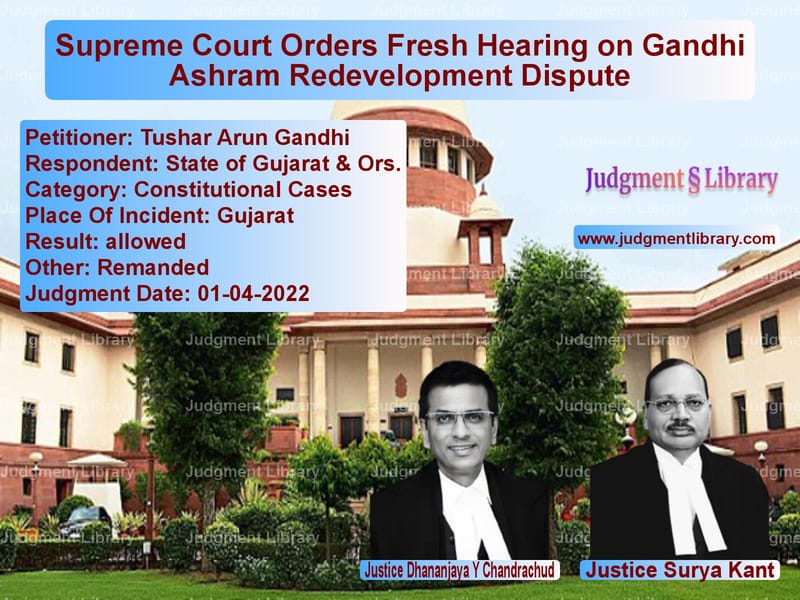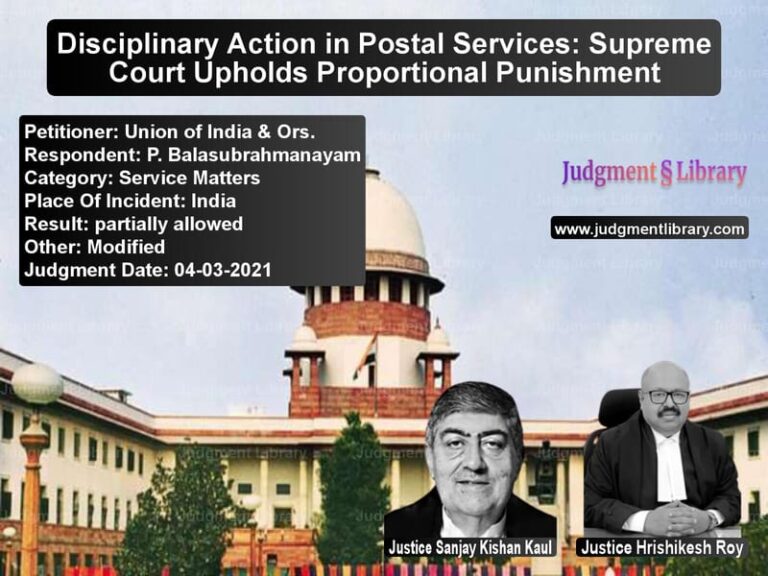Supreme Court Orders Fresh Hearing on Gandhi Ashram Redevelopment Dispute
The Supreme Court of India recently ruled on the case of Tushar Arun Gandhi vs. State of Gujarat & Ors., dealing with a Public Interest Litigation (PIL) challenging the redevelopment of the Sabarmati Gandhi Ashram. The case revolved around concerns regarding the preservation of the historic ashram and the role of the Gujarat government in its redevelopment.
Background of the Case
The petitioner, Tushar Arun Gandhi, a descendant of Mahatma Gandhi, filed a PIL before the Gujarat High Court under Article 226 of the Constitution. He challenged a Government Resolution dated March 5, 2021, issued by the Gujarat government, which constituted a Governing Council and an Executive Council for the development of the Gandhi Ashram Memorial. The petitioner argued that the redevelopment should be spearheaded by the trusts that currently manage the Ashram, rather than by the state government.
The High Court of Gujarat, however, dismissed the PIL without calling for a reply from the Gujarat government, citing an assurance by the Advocate General of Gujarat that the existing one-acre area of the Gandhi Ashram would not be disturbed. Dissatisfied with this ruling, the petitioner approached the Supreme Court.
Legal Issues
- Whether the Gujarat High Court was justified in dismissing the PIL without allowing the completion of pleadings.
- Whether the Government Resolution of March 5, 2021, affected the autonomy of the trusts managing the Gandhi Ashram.
- Whether the redevelopment project complied with the spirit of Mahatma Gandhi’s legacy.
Arguments by the Parties
Petitioner’s Arguments
- The petitioner contended that the redevelopment of the Gandhi Ashram should remain within the domain of the trusts managing it, with funding from the central and state governments.
- He expressed concerns that the state government’s involvement could dilute the historic and cultural significance of the Ashram.
- The Gujarat High Court erred by dismissing the PIL without allowing the parties to complete their pleadings or respond to the contentions.
State of Gujarat’s Arguments
- The Gujarat government assured the High Court that the one-acre core area of the Gandhi Ashram would remain undisturbed.
- The redevelopment project was aimed at preserving and promoting Gandhian values rather than altering the historical site.
- The project had been undertaken in consultation with the existing trusts and stakeholders.
Supreme Court’s Judgment
Key Observations
- The Supreme Court held that the Gujarat High Court should not have dismissed the PIL summarily without allowing a response from the state government.
- It noted that a fair hearing was necessary, given the cultural and historical significance of the issue.
- The Court did not comment on the merits of the redevelopment project but emphasized that the High Court must conduct a thorough examination.
Final Decision
The Supreme Court set aside the Gujarat High Court’s judgment and remanded the matter back for a fresh hearing. It directed the High Court to:
- Allow the Gujarat government to file a detailed affidavit.
- Ensure all stakeholders, including the trusts managing the Gandhi Ashram, are given a fair opportunity to present their views.
- Decide the case on merits, without being influenced by prior submissions made by the state government’s counsel.
“The High Court would form a fresh view after allowing the pleadings to be completed and hearing the parties. All the rights and contentions of the parties are kept open.”
Implications of the Judgment
For the Gandhi Ashram Redevelopment
- The ruling ensures that the redevelopment process undergoes judicial scrutiny before proceeding.
- It safeguards the interests of the existing trusts managing the Ashram.
- It ensures that the project aligns with the principles and legacy of Mahatma Gandhi.
For Judicial Procedure
- The judgment reinforces the principle that PILs must not be dismissed summarily without completing pleadings.
- It upholds the right to a fair hearing, particularly in cases involving public and historical interest.
For Future Government Projects
- The ruling serves as a precedent ensuring that redevelopment projects concerning cultural and historical heritage are subjected to judicial review.
- It highlights the importance of balancing government initiatives with the autonomy of private trusts managing historical sites.
Conclusion
The Supreme Court’s judgment in Tushar Arun Gandhi vs. State of Gujarat & Ors. underscores the need for judicial oversight in cases involving public heritage sites. By ordering a fresh hearing, the Court ensured that all concerns related to the redevelopment of the Gandhi Ashram are fairly addressed. The ruling sets a significant precedent for the protection of cultural heritage in India.
Petitioner Name: Tushar Arun Gandhi.Respondent Name: State of Gujarat & Ors..Judgment By: Justice Dhananjaya Y Chandrachud, Justice Surya Kant.Place Of Incident: Gujarat.Judgment Date: 01-04-2022.
Don’t miss out on the full details! Download the complete judgment in PDF format below and gain valuable insights instantly!
Download Judgment: tushar-arun-gandhi-vs-state-of-gujarat-&-o-supreme-court-of-india-judgment-dated-01-04-2022.pdf
Directly Download Judgment: Directly download this Judgment
See all petitions in Public Interest Litigation
See all petitions in Fundamental Rights
See all petitions in Legislative Powers
See all petitions in Judgment by Dhananjaya Y Chandrachud
See all petitions in Judgment by Surya Kant
See all petitions in allowed
See all petitions in Remanded
See all petitions in supreme court of India judgments April 2022
See all petitions in 2022 judgments
See all posts in Constitutional Cases Category
See all allowed petitions in Constitutional Cases Category
See all Dismissed petitions in Constitutional Cases Category
See all partially allowed petitions in Constitutional Cases Category







